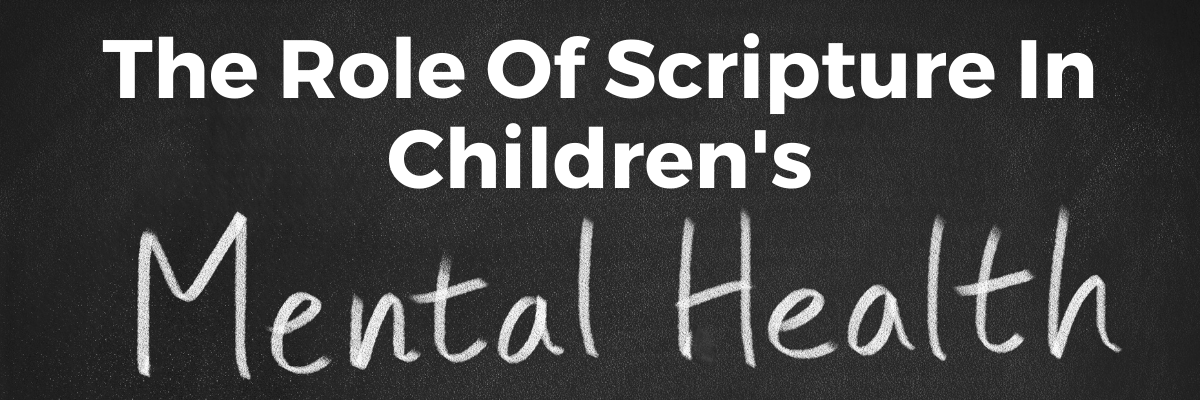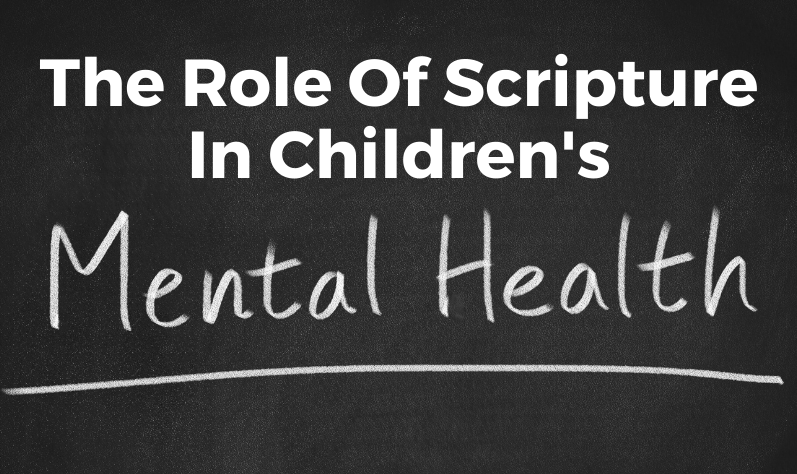The Role Of Scripture In Children’s Mental Health

by Niki Hodson
Due to the global pandemic, mental health issues among young people and children have increased by as much as 31% (Panchal et al, 2021)[1] and although psychology has a necessary part to play, we shouldn’t underestimate the crucial role of scripture in helping our children and youth through these difficult times.
WHEN CHILDREN’S THINKING BECOMES FAULTY
When a child is struggling with their mental health, it can manifest in negative bias, false attribution and catastrophic thinking. These are types of cognitive errors, where a child’s thinking becomes faulty:
- Negative bias means a child will focus on negative aspects of their experience. This will be at the cost of acknowledging and appreciating the positive aspects of their experience.
- False attribution is a child’s tendency to blame themselves for whatever happens around them. This is regardless of whether they are at fault or not, and is very common in kids with depressed mood.
- Catastrophic thinking means irrationally focusing on the worst possible outcome for every scenario. This is where a child’s mind can run away with them as they imagine the worst and think about it over and over.
All of these result in a child feeling fearful, worthless and like they want to hide from the world.
Over time, these kinds of thoughts can actually shift a child’s worldview into something very distorted.
This is where Scripture needs to enter in and play a primary role.
RIGHT WAYS OF THINKING
Scripture is God’s revelation to us about himself, and it is meant to strengthen, aid and direct us for Christian living. It is also meant to correct our worldview. This means it confronts and challenges our wrong ways of thinking, in order to lead us into right ways of thinking. This can be extremely helpful for children who are struggling with distorted views of themselves, others, the world and God.
An example of this is the child who is experiencing a very difficult situation. Perhaps they are witnessing their parents’ divorce, or going through the loss of a parent or sibling. Perhaps they are experiencing the pain and trauma of a long illness. Perhaps they are reacting to the unpredictability and stress of something like Covid or our country’s recent rioting and looting crisis. It could even be a smaller scale event like being kicked out of a group of friends at school (which can hurt just as much!). When bad things like this happen, a child will try to make sense of it. And if Scripture isn’t a central influence in their lives, they will come up with wrong ways of explaining things. Examples of this are:
- Things are always bad and they will never get better.
- No one cares about me – I am a mistake.
- I am all alone.
- Everything is my fault.
- I will never be safe again.
BIBLICAL CORRECTIVES TO A CHILD’S THINKING
Some examples of biblical correctives for the above are:
- God promises that he works all things for our good (Rom 8:28). He also promises that he uses the bad things in our lives for a good purpose (Rom 5:3-4). God also gives us the promise that one day he will make all bad things disappear (Rev 21:4).
- God made each of us carefully and lovingly (Ps 139:13-15). He loves and cares for everything he has made (Ps 145:9; 1 Pet 5:7). God made each of us with a specific and good purpose (Ps 139:16; Rom 8:28; 1 Pet 2:9).
- God promises to be with us always (Ps 32:8; Heb 13:5-6). He promises to help us and give us peace and strength. (Is 41:10,13; John 14:27).
- The world is a fallen place, and sometimes bad things happen because man has free will and is sinful (Rom 1:18-32). Some of these things are not our fault – they are because of other people’s sins, although we are also sinful (Rom 3:9-23).
- God promises to give us courage (Deut 31:6-8; 2 Tim 1:7; 1 John 4:18). He promises to give us wisdom to help us make good decisions (James 1:5). He also promises to give us peace (Is 26:3; John 14:27; Phil 4:6-7). He also promises he will answer our prayers when we need him (1 Pet 3:12; 1 John 5:14).
THE TRANSFORMATIVE POWER OF SCRIPTURE
In gently showing these truths to children and youth, we must not forget that all Scripture is powerful, living and active (Hebrews 4:12). This is not just a psychological method of correcting ‘self-talk’.
It is the application of the supernatural ability of the Word of God to bring about powerful shifts in one’s core beliefs and worldview.
So, to all who interact with young people, I encourage you to familiarize yourselves with these incredible truths of Scripture. I encourage you not to underestimate the power of Scripture to change a child’s wrong thinking and inaccurate core beliefs. I encourage you to give Scripture a central role alongside other forms of psychological interventions where they may be necessary. Let us not forget that the truest solution to improving children’s mental health is the powerful, living and active Word of God.
(first published by Scripture Union Magazine )
[1] Panchal, N., Kamal, R., Cox, C., Garfield, R. & Chidambaram, P., 2021. Mental Health and Substance Use Considerations Among Children During the COVID-19 Pandemic [Online].
Available at: https://www.kff.org/coronavirus-covid-19/issue-brief/mental-health-and-substance-use-considerations-among-children-during-the-covid-19-pandemic/ [Accessed 3 August 2021]
